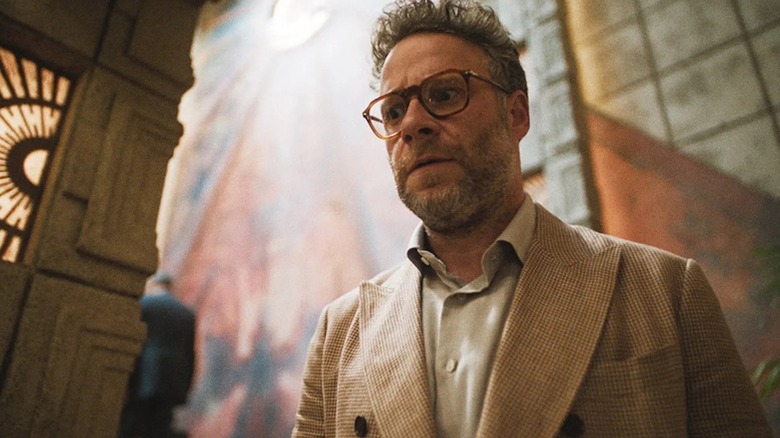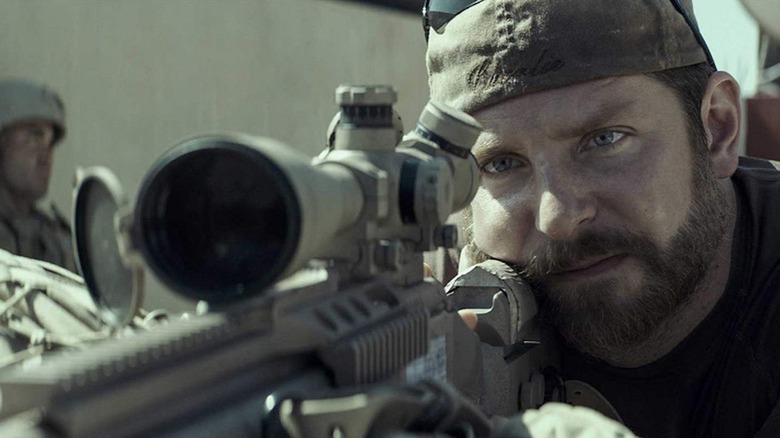Seth Rogen Had A Totally Valid Issue With A Clint Eastwood War Movie
"American Sniper" arrived at a very strange time in Clint Eastwood's career. He'd taken an uncharacteristic three-year break from directing after badly missing the mark with "J. Edgar" in 2011. Though he probably did a fair amount of shot-calling on the set of "Trouble with the Curve," where he was directed by his longtime behind-the-scenes collaborator Robert Lorenz, he was wise to ease up on the filmmaking reins because if you know anything about the game of baseball, it would be hard to make a worse movie than that one.
When Eastwood finally stepped behind the camera again for 2014's "Jersey Boys," he hadn't fully escaped the embarrassment of his bizarre 2012 GOP Convention speech where he ineptly roasted an empty chair occupied by an imaginary President Barack Obama. But directing an adaptation of a jukebox musical about The Four Seasons seemed thrillingly out of character for Eastwood; it could be just the thing to erase that clumsy convention performance from the world's collective memory. Alas, it was a sluggish Broadway transfer that was dimly lit and inexplicably light on music. "Jersey Boys" has its moments, but Eastwood was taking a risk at a moment he should've been playing to his strengths.
The prolific filmmaker's 2014 didn't conclude with "Jersey Boys." When his biopic about the life of highly decorated Navy SEAL Chris Kyle, "American Sniper," debuted at that year's AFI Film Festival in November, a majority of critics praised it as a triumphant return to form. I was in that audience and felt the strangest flood of emotions. At the time, on a purely technical level, I thought "American Sniper" was Eastwood's most accomplished film since "A Perfect World" (I would now say "The Bridges of Madison County"), but, thematically, it felt janky. It was an anti-war movie that assessed the sheepdog heroism of Kyle (who was shot dead by a PTSD-stricken former soldier at a rifle range in Texas), who became the greatest marksman in the history of the U.S. military. Kyle followed orders, and relied on his judgment to protect his fellow soldiers without killing innocent civilians. This was an impossible task, one that understandably haunted Kyle, but there was a dark side to this man. Kyle bizarrely bragged that he and a friend drunkenly shot dozens of armed civilians during the immediate aftermath of Hurricane Katrina. He also made other wild claims that appeared to be total lies, so it bothered me greatly when Eastwood concluded "American Sniper" with real-life footage of his memorial at Cowboys Stadium in Dallas, Texas. This was like granting Kyle sainthood. And moviegoers packed theaters to pay their respects at the box office.
Even though I admire most of this movie, this decision still irks me. It also bothered Seth Rogen, and he caught some serious flack over expressing his opinion.
Rogen understood that Eastwood undercut American Sniper by whitewashing Chris Kyle's life
Rogen is, in my experience, one of the most principled people in the entertainment industry, so I perked up when, on January 18, 2015, he tweeted "'American Sniper' kind of reminds me of the movie that's showing in the third act of '[Inglourious] Basterds.'" That fictional film, "Nation's Pride," venerates the heroic lethality of Nazi sniper Fredrick Zoller (Daniel Brühl), which led many to accuse Rogen of comparing "American Sniper" to Nazi propaganda. All his tweet did for me was crystalize what troubled me about Eastwood's movie.
Right-wing outlets went on the attack, which forced Rogen to issue a response acknowledging that he "actually liked" the film and that he had the utmost respect for veterans. "My grandfather was a veteran," he wrote. "My comment about the movie was not meant to have any political implications. Any political meaning was ascribed to my comment by news commentary."
I was writing for Ain't It Cool News at the time and had given up writing about "American Sniper" because I didn't want to be the guy noting that Eastwood, to paraphrase "The Man Who Shot Liberty Valance," had printed an admiring legend about a preternaturally skilled killer who was murdered by a man just as twisted and broken by violence as he was. Eastwood is one of my favorite directors, primarily because he's always been willing to depart from his tough-guy persona by playing weak, conflicted, or straight-up freaks (as he did in the underrated "Tightrope"). And in this case, I got what (I think) Rogen was saying: Eastwood had made a great film that face-planted by turning into an ode to Kyle's service, when, in actuality, the movie spent the bulk of its runtime demonstrating how his unswerving commitment to his fellow soldiers destroyed him.
So, I finally wrote about "American Sniper," a movie that did its audience and subject dirty by sanitizing the dehumanizing effect allegedly righteous killing exacts on people who are meant to love, learn, and leave this planet having improved it.

